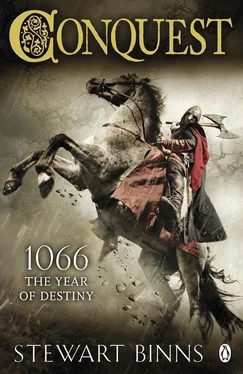To all those valiant souls who fought for their freedom in the years 1066 to 1071 – history has not forgotten you .
Here begins a certain work concerned with the exploits of Hereward the renowned Knight… We think it will encourage noble deeds and induce liberality to know Hereward, who he was and to hear of his achievement and deeds, and especially to those who are desirous of living the life of a soldier. Wherefore we advise you, give attention and you who the more diligently strive to hear the deeds of brave men, apply your minds to hear diligently the account of so great a man. For he, trusting neither in fornication, nor in garrison, but in himself, alone with his men waged war against Kingdoms and Kings and fought against princes and tyrants.
De Gestis Herwardi Saxonis (The Life of Hereward the Saxon), a story written by monks early in the twelfth century
And they talked and sang of the Wake and all his doughty deeds, over the hearth in lone farmhouses, or in the outlaws’ lodge in the hollins green; and all the burden of the song was, ‘Ah that the Wake was alive again!’ For they knew not that the Wake was alive for evermore; that only his husk and shell lay mouldering there in Crowland choir; that above them and around them, and in them, destined to raise them out of their bitter bondage and mould them into a great nation, and the parents of still greater nations in lands as yet unknown, brooded the immortal spirit of the Wake, now purged from all earthly dross – save the spirit of freedom, which can never die.
Hereward, the Last of the English , Charles Kingsley, 1877
In the middle of the eleventh century, three men fought for the future of England and the British Isles.
The victor, William the Bastard, Duke of Normandy, became King of England. His ruthlessness, his all-consuming lust for power and his outstanding skill as a leader founded a Norman dynasty that led England to become the most formidable political force in northern Europe.
England was not conquered easily. Its many tribes of Celts, Danes and Saxons had fearsome reputations in battle and strong traditions and cultures. There were many crucial incidents, but the Battle of Senlac Ridge, near Hastings, on the southern coast of England, on 14 October 1066, was the defining moment. Only a few days after he had defeated the Norwegian King, Harald Hardrada, at Stamford Bridge near York, the slaughter of Harold Godwinson, King Harold II of England, in what became known as the Battle of Hastings, changed the course of world history for ever. William’s victory cast him as the villain, while Harold came to be seen as the heroic leader of a brave but vanquished people.
However, there was another man of those times whose heroic deeds were almost lost in legend.
This is the story of that man.
He became William’s most formidable opponent, a man whose name would become synonymous with the dormant spirit of England under the Normans and all that ‘Englishness’ eventually came to mean.
The hour was growing late but the rapidly descending sun was still strong and the heat of a hot summer’s day had yet to subside. The undulating hills of Greece’s western Peloponnese gave little hint of human activity except where an occasional shepherds’ track cut a path over the high ground. Only in a few places had men made more permanent marks. Lonely chapels – simple stone sanctuaries, topped by Byzantine crosses – were totems of peace and truth in a world mostly bereft of such treasures.
High above the rugged hills, an old man sat on a rocky perch contemplating the far horizon to the north-west. He looked towards his homeland, a distant land he had not seen for over fifty years. His eyes watered as he peered at the waning red orb of the setting sun.
Several hundred feet below, amid the forests of pine, a column of mounted men turned into an open meadow. The stone chapel at the edge of the glade had small round windows, a solid oak door and a simple wooden hut behind the nave for the resident priest. The men dismounted after a long day in the saddle, and stretched their legs. They were an awesome group of men: fifty Varangians and fifty Immortals, supported by a baggage train of servants, cooks and grooms. All were in the service of two of the most important men in the civilized world: the revered Prince John Azoukh, formerly a Turkish slave, now a royal prince, and Prince John Comnenus, the son of Alexius Comnenus I, Emperor of Byzantium, a man on whose shoulders rested the hopes of an ancient lineage and a mighty empire.
Leo of Methone had been listening to the approaching commotion for nearly half an hour. He had been educated in Athens, had worshipped in Rome and had even prayed at the altar of the great church in Constantinople. He knew to fear the tread of advancing armies.
It was late August in the year of Our Lord 1117. Anxiety gripped the Byzantine Empire, an empire begun in pagan Rome over 1,000 years earlier that now stood between Christianity and the heresy of Islam.
Leo had hidden in the undergrowth long before the soldiers arrived at his peaceful clearing. He was greatly relieved to see that they were men of the Emperor’s army rather than a band of brigands, but astonished when he recognized them as Imperial Guards and realized who was leading them. He knew from his dress that the man at the head of the group was of the royal house, but the presence of the dark-skinned man next to him confirmed that the two lords were the renowned ‘Two Johns of Constantinople’.
Leo’s heart was pounding from exertion and anxiety. His mind raced: why is the young heir to the throne of Byzantium here? It is known throughout the Empire that his father is dying and that his sister, Anna Comnenus, will do anything to take the throne and rule with her husband, Bryennius. So why leave Constantinople on a journey of many weeks at a time like this?
Leo’s train of thought was broken by the Captain of the Imperial Guard barking his orders: ‘Troopers of the Princes’ Guard, dismount! We camp here tonight.’
John Comnenus watched with amusement as Leo the priest approached him. His dark-brown cassock was scuffed with dirt from his hasty retreat to the undergrowth, he was covered in thorns and seedlings from his prickly hiding place, and his sandals squelched from the soaking they had received as he waded the stream behind his church.
‘Good evening, Father. May we spend this night with you?’
Leo had never spoken to a prince before. He summoned all the composure his ecclesiastical education could afford him. ‘Your Highness, it would be a great honour. But I have little to offer you other than God’s house… and…’ He hesitated, nervous about his presumptuousness, ‘… my blessing.’
The young heir smiled broadly, supremely confident in his status and authority.
‘That is all a weary man needs. Besides, we travel well with all the trappings of court. Will you join us? The butt is Cypriot, from my father’s vineyard; our cook is a Venetian and he can conjure a feast from old leather and the bark of a tree if you give him gentle oil and keen spices.’
Leo recognized immediately that what people said was true: John Comnenus was a man of great charm and humility.
‘Sire, you are more than generous. But I am a poor priest of the countryside; I know nothing of the sophistication of towns and cities, and certainly nothing of the manners of a royal table.’
Читать дальше












